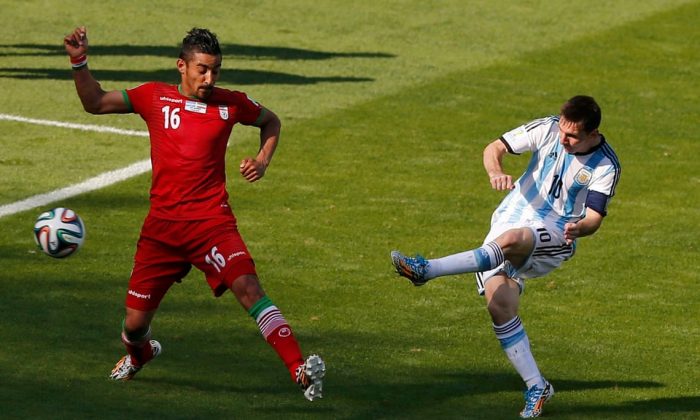My favourite game: Argentina v Iran, 2014 World Cup

The Guardian – LONDON, My dad and I went from despair and frustration to pandemonium after Lionel Messi struck in style at the death
The Argentinian radio journalist Alejandro Fantino shouted “We are a disaster” in the 89th minute. He was right. The match that most had expected to be a rout was turning into a historic upset.
Argentina were as bad as Iran were good. Gonzalo Higuaín, Sergio Agüero and Ángel Di María were not working as a front three while the Asian champions were performing especially well at the back. Carlos Queiroz, Iran’s manager, appeared to have perfected the defensive formula that had plagued Argentina during the qualifiers: a parked bus and Lionel Messi well under control.
Through the 90-inch plasma TV, it was clear that the spectre of Argentinian expectations hung over Messi just as much as Diego Maradona’s presence did in the stands. Messi was quiet and I was too on that summer afternoon. He was lost in the Mineirão Stadium while I sat clutching a beer at a Persian rooftop party in Miami.
My friend’s Iranian father had invited me to watch this Group F game over a barbecue at his new downtown penthouse. Still a teen, I brought my dad with me. He drove, I drank, and we were the only Argentinians in attendance. We rode the elevator in our Argentina jerseys, bursting with pride. But upstairs, interest in the match was casual. People ate burgers and chatted while we munched our nails and breathed through every second of the contest in front of us.
Messi’s inability to carry us to success, allied to his demure manner, were a cocktail of weakness that made him in the eyes of many, if not most, a pecho frío. For some he was not evenArgentinian. Every minute we didn’t score was an excruciating one as we watched the narrative of his and our greatness trickle away. The veil was lifting and for the generation who had seen Maradona conquer the world, and for another who had grown up on Diego’s legend, patience was wearing thin.

As the game trudged on I buried the feelings of impending doom in a few more beers, and had VAR existed back then, or had the referee had “super-slow-mo cyborg vision”, as Barney Ronay put it in his match report for the Guardian, it could have been worse, for Iran were denied what was clearly a penalty for a foul on Ashkan Dejagah in the 55th minute. But history is written by the victors.
The party had mostly turned away from the TV and I had already received a few consoling pats on the back from guests as the game entered injury time. But then Fantino, I and the rest of the country ate our words. From the same spot he had lingered looking toothless and ineffective, and following a pass from Ezequiel Lavezzi, Messi curled the ball over two Irani defenders – one nicknamed Gucci – and, finally, the goalkeeper. It was a wonderful finish and also meant Argentina had qualified for the knockout stages.
“Thank you, Pulga! Thank you, Messi! Thank you, Argentina!” screamed Fantino at the top of his voice. Meanwhile my dad and I absolutely lost it. We hugged and jumped up from our bar stools, also screaming at the top of our voices. My beer and a few others flew, soaking burgers and clothing nearby. It was a pure release, for in that moment the pain of waiting for success expired. Past and present met and the feeling lasted all of two more weeks, until Mario Götze did what he did in the final.
When the ecstasy passed on that afternoon, my dad apologised to the host for soaking everyone’s food and clothing. He understood.




